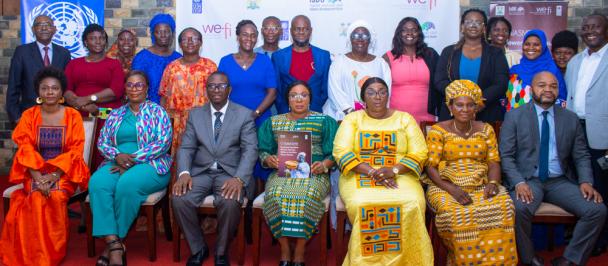Talking about Kosovo’s digital potentials for an inclusive digital transformation
August 22, 2022
Digitalization presents unprecedented opportunities to accelerate sustainable development. It is progressively changing the way we work, the way we access services and interact with each other. With an almost 100% internet penetration rate and a vast majority of population accessing the internet, Kosovo finds itself well-positioned for leveraging the power of the digital for improved social well-being and economic development.
In exploring the digital status and potentials of Kosovo via methods such as desk research, numerous consultations, and two large-scale surveys, UNDP has concluded that Kosovo is systematically advancing in key areas of digital transformation. Digital transformation has become a critical component of resilience, responsiveness, and adaptability in public and private sectors. Nevertheless, digital transformation needs to be inclusive for Kosovo to reach its fullest digital potential. This means supporting the development of digital strategies and plans at the central level in a coordinated manner with public and private entities, and most importantly, with the people.
As part of UNDP Kosovo’s digital journey, over the past year, we have gathered important data and insights through the Digital Readiness Assessment (DRA) and the Digital Household Survey (DHS). The assessments have provided a number of important insights related to skills matching, gender disaggregated data driven, technological adoption, productive use of technology, digitalization of public services, as well as accessibility and trust in devices, and ICT security overall. These insights and recommendations were brought to a cross-sectoral discussion on our “Digi Talks: The Future is Digital”, with guest experts, from both the public and private sectors, who are contributing to advancing Kosovo’s digital transformation.
On data-driven decision-making
Regulatory priorities often focus on data standards and protection - from open data to data privacy - and those that drive the development of a broader digital economy. Based on the DRA survey, most public officials at central level are uncertain of existing digital regulations and policies - which indicates a gap in technical capacity. The Advisor to the Prime Minister on IT, Mr. Lulëzon Jagxhiu, said that until recently, central institutions have been focusing their digitalization efforts mostly on administration. He points to the need for greater coordination among central institutions toward comprehensive digital transformation. A newly established Digital Transformation Unit (DTU) is directing its efforts mainly on education, banking, and e-commerce, with user-centricity at the core.
Currently, there are few digital public services and people have limited access to open public data. While an open data portal exists - managed by Agency of Information Society (AIS) - there appears to be little knowledge of it, and how to leverage it for businesses and public sector purposes. Ms. Blerta Thaçi, the Founder of Open Data Kosovo - an NGO that works towards advancing e-governance - has greatly contributed to a more open, transparent and accountable society through projects fostering open data, youth empowerment, and ICT development. According to her, it is crucial to educate the public and the private sector on data use that can ultimately lead to an increased demand for data access. A higher demand for data access, means a greater level of transparency from public institutions. However, obstacles in educating the public sector officials to working with data is partly due to lack of technical staff and maintenance systems, i.e. a functional framework that allows for the different institutions to regularly open data and provide new open datasets. This is confirmed by the Sector Lead in AIS, Mr. Arben Krasniqi, who further adds the lack of institutional responsibility as a barrier towards having proper digital services in place.
The Director of Post, Telecommunications and ICT Department in the Ministry of Economy, Mr. Agim Kukaj, confirmed that many consultations are underway in the process of drafting the Kosovo Digital Agenda 2030. Issues such as the productive use gap, and data privacy and protection are central to the Agenda. According to Mr. Kukaj, it is fortunate that Kosovo has no cultural barriers for technology development. This statement is backed through the Digital Household Survey findings indicating that 93% of 2,400 household respondents show high willingness to master and use new technologies. He confirms that Kosovo will reach 100% internet coverage by August 2022 with Theranda/Suva Reka being the last town to be covered. The full internet penetration rate coupled with the confidence people place on technology presents an ideal foundation for their engagement with digital tools and data. Nevertheless, it is crucial that the institutions at central level gather more data to better understand accessibility and usability issues to be able to develop more inclusive strategies.
On advancing digital literacy
The ICT sector is one of the most important service sectors in Kosovo’s economy, providing employment, generating a significant share of the GDP, and serving as a catalyst for the creation of a highly skilled “knowledge economy” workforce. Even so, digital literacy remains relatively low, especially when it comes to advanced use of devices. The Digital Household Survey shows clear indication of a large divide in terms of productive use of devices and networks, whereby most usage is limited to social media and communication, with low levels of usage around e-collaboration, e-banking, web content creation, coding, etc. A significant digital divide is also pronounced between lower-income households and other households with a higher income level.
UNDP’s Digital Readiness Assessment highlights that the private sector is seen as an important partner in the digital economy, but digital transformation cannot be led solely by businesses. Public education institutions continue to face challenges in developing and integrating ICT curricula that are more responsive to the labor market needs. “Advancing digital literacy requires designing education curricula based on international standards and communicating with private sector entities in order to ensure the curricula remain relevant,” – said Mr. Kadri Sylejmani, Vice Dean at the Faculty of Electrical and Computer Engineering, University of Pristina. The DRA findings show that despite several attempts to integrate ICT into pre-university education, most of them resulted unsuccessful for reasons that need to be more thoroughly understood.
A functional collaboration between academia, the private sector and civil society, comprises an innovation ecosystem that is crucial for a sustainable digital economy. The student dropout rate presents a concern for Mr. Sylejmani, considering the implications of students interrupting their academic endeavors to directly enter the labor market. By the end of the university program, few students are left conform the number of professors. He highlights the need for increased formal education efforts in offering digital skills at earlier education stages, while taking into account market needs. As implied, dropouts in academia are noticeable in the disproportionate number of ICT trainees vis-a-vis academic professionals. According to the Starlabs Co-Founder, Mr. Darsej Rizaj, many people drop out mid-way through ICT courses, and consequently, only two people become teachers out of 2,000 individuals trained in programming. “How do we design a program that is relevant and consistent?” – asks Mr. Rizaj in flagging a systemic problem that impacts the future of digital workforce.
Looking into Kosovo’s ICT demographics, the Director of STIKK, Ms. Vjollca Çavolli points at the skilled workforce migration as a sector problem, linked to education and well-being of future generations. The panelists discussing digital skills for digital transformation clearly agreed about the gap between ICT industry needs and capacities of education institutions in providing these skills. Prioritizing digital literacy in the early stages of education means building a coherent system that produces aspiring ICT professionals.
On the way forward
Assessing Kosovo’s readiness for digital transformation begs to explore the opportunities and challenges offered by data use and access, and digital literacy skills. This exploration journey is guided by our Digital Transformation Portfolio that aims to understand the local digital landscape and support inter-connected initiatives that systematically learn from each other. UNDP Kosovo is committed to supporting a successful digital transformation that is inclusive and empowers Kosovo to achieve the Sustainable Development Goals (SDG).
Photos by Xhemail Sllovinja for UNDP Kosovo

 Locations
Locations



